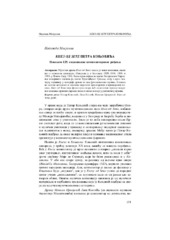Prikaz osnovnih podataka o dokumentu
Prince of zeta by Petar Konjović: Opera in five/four acts on the 125th anniversary of the composer's birth
Knez od zete Petra Konjovića - povodom 125. godišnjice kompozitorovog rođenja
| dc.creator | Mosusova, Nadežda | |
| dc.date.accessioned | 2018-05-07T11:29:19Z | |
| dc.date.available | 2018-05-07T11:29:19Z | |
| dc.date.issued | 2008 | |
| dc.identifier.issn | 1450-9814 (print) | |
| dc.identifier.uri | https://dais.sanu.ac.rs/123456789/2644 | |
| dc.description.abstract | Petar Konjović (Čurug, May 5, 1883 - Belgrade, October 1, 1970) stands out among Serbian composers as an author of instrumental and vocal compositions. Studies at the Prague Conservatory (1904-1906) acquainted Konjović with Czech music, Wagner's opus, and the Russian national-romantic school, which contributed to the evolution of his talent for both music and stage, enabling him to express his ideas more explicitly in operatic works. It was in the Prague that the second opera - Prince of Zeta - was conceived, with new musical vividness and dramatic appeal (first version composed 1906-1926, the second and final 1929-1939), followed by Koštana (1928), Peasants (1951) and Fatherland (1960). Konjović's mature operas are characterized by his masterful handling of form, both in close-ups and in detail, as well as his deeply individual assimilation of musical folklore into his work. The Prince of Zeta is not to be understood as a folk opera, but some main themes are directly derived from folk music, precisely from the Montenegrin folk songs quoted in the Mokranjac's Ninth Garland and treated in Konjović's post-romantic, almost expressionistic way, interwoven with some Italianate leitmotifs, so as to present the opera's two worlds, Montenegrin and Venetian. In the process of forming Konjović's operatic style, with vocal parts based mainly on the principle of declamation, the opera Prince of Zeta (first performed in Belgrade, 1929, conducted by Lovro von Matačić) proved to be a work of great impact. Hardly anyone grasped then the wide sweep of inspiration which allowed the composer to set and to solve several important problems connected with music drama, essential also in his subsequent stage works. First of all, Konjović had to handle in his own way the verbal drama the prototype of his opera, Maxim Crnojević by the Serbian poet Laza Kostić (1841-1910). Permission came from the playwright in the first decade of the 1900, Prince of Zeta being partly set musically, but from then on with new interventions in the poet's text. Being a highly skilled writer, poet musicologist and essayist (he wrote four books and a great number of articles on music and the theatre, and translated opera librettos of Wagner and Moussorgsky), Konjović felt free to introduce some daring alterations to the literary works he used for his music dramas. So it was with the play Maxim Crnojević, premiered in Novi Sad in 1870 (printed in the same place in 1846 and 1866). On the other hand, the young poet Kostić (he was in his early twenties when he wrote Maxim Crnojević) had the prototype for his play in the folkpoem The Marriage of Maxim Crnojević, turning a naturalistic folk-story into a Hellenic-Shakespearian drama of friendship and love, full of chivalrous deeds and emotions. The once handsome Maxim, his face ruined by heavy disease, can no longer make his marriage with the doge's daughter Angelica (with whom he was already acquainted). The nobles of Montenegro particularly Ivo Crnojević, who in the meanwhile, proud of his son, boasted in Venice, conspire a doublecrossing plot (with another man, Miloš resembling Maxim as bridegroom) which works in the folk-poem, in some ways in drama, but not in the opera, with the story changed by Konjović. The difference between drama and folk poetry is essential: in Montenegro Maxim murders Miloš for the doge's daughter's dowry, on their way back. In the play, too, the tragic event takes place in Montenegro: on the way home Maxim kills Miloš, thinking Miloš is going to keep the beautiful Angelica for himself (the agreement was that he will hand over the bride to Maxim immediately after the wedding in Venice), then commits suicide realizing his fatal mistake. The girl, deeply disappointed leaves Montenegro. In the opera Maxim reveals the truth to Angelica in Venice, before she is to be wedded with Miloš, and stabs himself. She chooses death also, drinking poison - a dramatically and musically very capturing finale in the style of Romeo and Juliet! In some recently performed versions of the opera (1989) the director (Dejan Miladinović) and conductor (Oskar Danon) returned to the playwright's original denouement, avoiding the Shakespearian end of Konjović (although in the spirit of Kostić who was also appreciated as a skillful translator of Shakespeare into Serbian language). In the opera Prince of Zeta Konjović focuses on Ivo Crnojević, making his role dominant to that of Maxim. The unhappy father, the tragic Hellenic figure, is with his son Maxim the main historical personality in both opera and drama. Zeta forms part of present-day Montenegro but was independent for a short period, then came under Byzantium, and eventually Rashka-Serbia. After the fall of last remnants of the Serbian vassal state in 1439, Zeta was partly independent protected by Venetians under the ruler Ivo Crnojević, before the Turks grasped Montenegro. Serbian drama, which is usually trochaic, took an iambic course in Kostić's play. The composer preserved the poet's iambs, following the musically accented flexions of spoken language, which remains the main feature of his style. The impressive vocal parts, especially those of Ivo Crnojević, starting from the Prologue and the first act, are supported by the dynamic and highly symphonized orchestra. For effective choral music the monks' ensemble in the second act (in the final version) and the dramatic Venetian carnival scene with the stylized Montenegrin folk-dances should be noted in both versions. With Prince of Zeta the author definitely made a distinguished name as a composer in Serbian culture, with a strong influence on younger generations of Serbian musicians. | en |
| dc.description.abstract | Muzička drama Knez od Zete imala je više postavki, svaki put s naznakom premijere. Izvedena je u Beogradu 1929, 1946, 1968. i 1989, u Novom Sadu 1966. Njena prva pojava na sceni beogradskog Narodnog pozorišta značila je posle Hristićevog Sutona, novu i vrlo značajnu stranicu u istoriji srpske i tada jugoslovenske muzike. Sazdana na osnovi melodike i tekstova narodnih crnogorskih i primorskih pe- sama, Knez od Zete nije folklorna opera već eklatantan primer modernog shvatanja primene narodne pesme i epske poezije u umetničkoj muzici. | sr |
| dc.rights | openAccess | |
| dc.rights.uri | https://creativecommons.org/licenses/by-nc-nd/4.0/ | |
| dc.source | Музикологија / Musicology | |
| dc.subject | Petar Konjović | sr |
| dc.subject | Laza Kostić | sr |
| dc.subject | Maksim Crnojević | sr |
| dc.subject | Knez od Zete | sr |
| dc.subject | jamb | sr |
| dc.title | Prince of zeta by Petar Konjović: Opera in five/four acts on the 125th anniversary of the composer's birth | en |
| dc.title | Knez od zete Petra Konjovića - povodom 125. godišnjice kompozitorovog rođenja | sr |
| dc.type | article | |
| dc.rights.license | BY-NC-ND | |
| dcterms.abstract | Мосусова Надежда; Кнез од зете Петра Коњовића - поводом 125. годишњице композиторовог рођења; Кнез од зете Петра Коњовића - поводом 125. годишњице композиторовог рођења; | |
| dc.citation.spage | 151 | |
| dc.citation.epage | 165 | |
| dc.citation.issue | 8 | |
| dc.identifier.doi | 10.2298/MUZ0808151M | |
| dc.type.version | publishedVersion | |
| dc.identifier.fulltext | https://dais.sanu.ac.rs/bitstream/id/20383/2722.pdf | |
| dc.citation.other | (8): 151-165 | |
| dc.identifier.rcub | https://hdl.handle.net/21.15107/rcub_dais_2644 |

